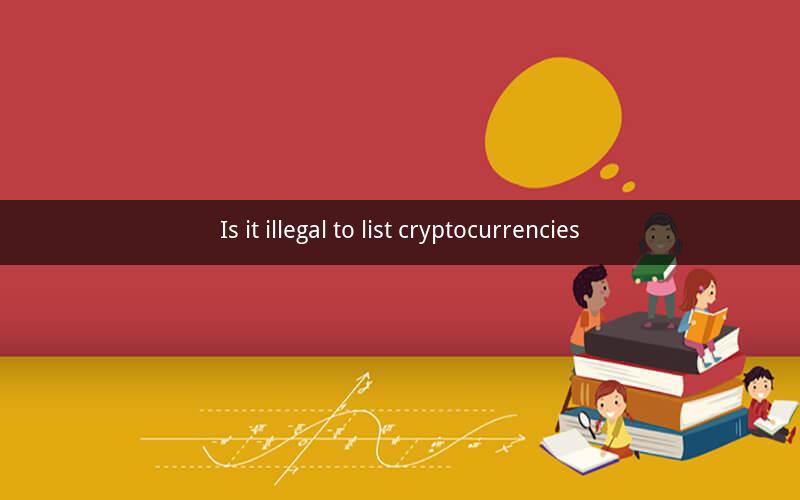
Is It Illegal to List Cryptocurrencies?
Table of Contents
1. Overview of Cryptocurrency Listings
2. Legal Framework for Cryptocurrency Listings
3. Jurisdictions with Specific Regulations
1. United States
2. European Union
3. Asia-Pacific Region
4. Risks Associated with Cryptocurrency Listings
5. Conclusion
1. Overview of Cryptocurrency Listings
Cryptocurrency listings refer to the process of adding a digital currency to a trading platform or exchange. This process has gained significant attention as the cryptocurrency market has grown exponentially. However, the legality of listing cryptocurrencies varies depending on the jurisdiction and the specific regulatory framework in place.
2. Legal Framework for Cryptocurrency Listings
The legality of listing cryptocurrencies is primarily determined by the classification of these digital assets. Governments and regulatory bodies worldwide have been grappling with the challenge of categorizing cryptocurrencies as commodities, securities, or utility tokens. This classification affects the legal requirements for listing and trading these assets.
3. Jurisdictions with Specific Regulations
1. United States
In the United States, the Securities and Exchange Commission (SEC) plays a crucial role in regulating cryptocurrency listings. Under the Howey test, a digital asset can be classified as a security if it involves an investment of money in a common enterprise with an expectation of profit from the efforts of others. As a result, many initial coin offerings (ICOs) and certain cryptocurrencies have been deemed securities, necessitating compliance with securities laws.
2. European Union
The European Union has taken a proactive approach to regulating cryptocurrency listings. The Markets in Crypto-Assets (MiCA) Regulation aims to provide a harmonized legal framework for crypto-assets, including those used in listings. The regulation categorizes crypto-assets into four main types and outlines the requirements for issuers and operators of crypto-asset service providers.
3. Asia-Pacific Region
In the Asia-Pacific region, regulatory approaches vary significantly. Japan, for instance, has implemented a comprehensive regulatory framework for cryptocurrency exchanges, requiring them to obtain licenses and adhere to strict anti-money laundering (AML) and know your customer (KYC) requirements. China, on the other hand, has banned cryptocurrency trading and mining activities, making it illegal to list cryptocurrencies within the country.
4. Risks Associated with Cryptocurrency Listings
Listing cryptocurrencies on exchanges comes with various risks, including:
- Regulatory Risks: The legal status of cryptocurrencies can change rapidly, leading to potential legal consequences for exchanges and investors.
- Security Risks: Cryptocurrency exchanges are prime targets for cyber attacks, which can result in the loss of funds and reputational damage.
- Market Risks: The volatile nature of the cryptocurrency market can lead to significant price fluctuations, affecting the profitability of listings.
5. Conclusion
The legality of listing cryptocurrencies depends on the jurisdiction and the specific regulatory framework in place. While some countries have implemented comprehensive regulations, others are still in the process of developing their legal frameworks. Exchanges and investors must navigate these complexities to ensure compliance and mitigate potential risks.
Questions and Answers
1. Q: What is the primary factor in determining the legality of listing cryptocurrencies?
- A: The primary factor is the classification of cryptocurrencies as securities, commodities, or utility tokens, which varies by jurisdiction.
2. Q: How does the SEC in the United States classify cryptocurrencies?
- A: The SEC uses the Howey test to determine if a cryptocurrency is a security, depending on whether it involves an investment of money in a common enterprise with an expectation of profit.
3. Q: What is the MiCA Regulation in the European Union?
- A: The MiCA Regulation is a comprehensive legal framework for crypto-assets, categorizing them into four types and outlining requirements for issuers and operators.
4. Q: What risks are associated with cryptocurrency listings?
- A: The risks include regulatory changes, security breaches, and market volatility.
5. Q: Why are some cryptocurrencies deemed securities?
- A: Cryptocurrencies are deemed securities if they involve an investment of money in a common enterprise with an expectation of profit.
6. Q: How do exchanges mitigate security risks?
- A: Exchanges mitigate security risks through robust cybersecurity measures, including encryption, multi-factor authentication, and regular security audits.
7. Q: What is the impact of the volatile nature of the cryptocurrency market on listings?
- A: The volatility can lead to significant price fluctuations, affecting the profitability of listings and potentially leading to investor losses.
8. Q: How do governments classify cryptocurrencies?
- A: Governments classify cryptocurrencies based on their characteristics, such as whether they represent a security, a commodity, or a utility.
9. Q: What are the requirements for listing a cryptocurrency in Japan?
- A: Exchanges in Japan must obtain a license from the Financial Services Agency (FSA) and comply with strict AML and KYC requirements.
10. Q: How does the Chinese government view cryptocurrency listings?
- A: The Chinese government has banned cryptocurrency trading and mining activities, making it illegal to list cryptocurrencies within the country.